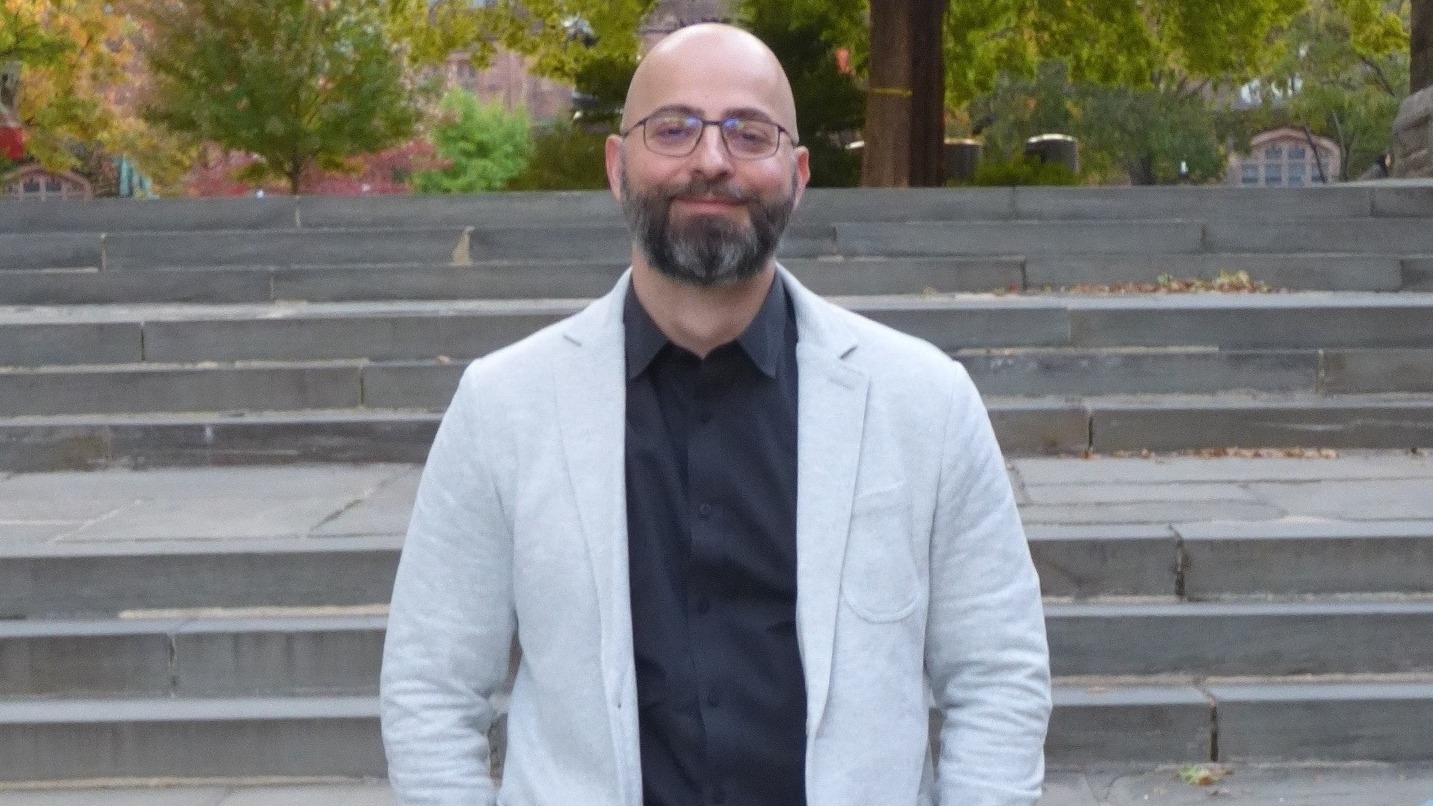
A Greek history aficionado, coffee enthusiast, and passionately curious researcher, Dr. Vasilis (Bill) Molos is the University of Guelph-Humber’s new Chair of the Liberal Studies department.
Here’s what you should know about Dr. Molos, who you’ll be seeing around the hallways of the University starting this Winter 2025 semester.
Q: Welcome to the University of Guelph-Humber! As the new Chair of Liberal Studies, what drew you to this role?
A: Thank you for the warm welcome. What really caught my eye about the University of Guelph-Humber was the unique blend of academic rigour and hands-on, real-world application — the hallmarks of a truly innovative education. I’ve always believed that a robust grounding in the humanities instills the critical thinking, empathy, and creativity that our rapidly changing world demands. When I saw U of GH’s commitment to interdisciplinary collaboration and student-centred learning, I knew immediately that this was a place where I could really make a difference in shaping the next generation of engaged citizens and leaders.
Q: You have an extensive education in History, from your BA to MA to PhD. Why are you passionate about this Liberal Arts subject and what’s your area of historic expertise?
A: History, for me, is both a window and a mirror. It’s a window into diverse human experiences across time and place, and a mirror reflecting how our past informs who we are today. I’ve found modern Greek history particularly intriguing because of the silences that obscure some of its most transformative events. One such moment—the 1770 Orlov revolt — was the focus of my graduate research. Though this uprising failed, it was a watershed in the evolution of modern Greek identity. Yet it’s often overlooked, illustrating how the stories we don’t tell can be just as critical as those we do.
Q: Speaking of Greek history, you’re the Director and Research Lead of the Hellenic Heritage Foundation (HHF) Greek Canadian Archives at York University. Please tell us about what you do here.
A: The HHF Greek Canadian Archives is a rich collection of materials that reveals the breadth of Greek-Canadian life. It includes newspapers, videos, audio cassettes, associational records, and oral history interviews that shed light on the pivotal moments that have shaped Greek-Canadian communities. In my role, I help chart the project’s strategic vision, build partnerships with potential donors, and oversee new acquisitions. I also research and write about these holdings, curate resources to bring these stories to life, and collaborate with students, scholars, and community members to ensure these narratives find a wider audience — both in academic circles and beyond.
Q: You’ve taught in universities around the world, including in New York City and in Abu Dhabi, United Arab Emirates. What sorts of academic and life experiences did you encounter?
A: In New York, the size of institutions like NYU and Fordham meant I had classes filled with students from a broad range of majors and backgrounds. My goal was to create a sense of belonging for everyone, so I designed collaborative, student-centered activities that encouraged them to learn from one another. Meanwhile, at NYU Abu Dhabi, I discovered the power of global experiential learning — especially through the short, intensive “January Term” courses. These sessions push students beyond the classroom to explore a culture through guided fieldwork. Both experiences showed me how vital inclusivity, dialogue, and empathy are in higher education — values I’m eager to champion here at U of GH.
Q: Please tell us about the book you’re authoring, “The Russian Mediterranean: Shaping Sovereignty and Selfhood on the Island of Paros.” When can we read it?
A: This project delves into the Russian naval presence in the Mediterranean in the late 18th century, exploring how it impacted Greek identity and political imagination. My research highlights the ways people refashion their sense of self and community in times of change. I’m excited to share that the book is nearly completed, and I’m hoping it will be available in 2026.
Q: When you’re not at work, what do you enjoy doing?
A: I’m a firm believer that curiosity extends beyond the classroom. Whether it’s exploring Toronto’s diverse culinary scene, taking a scenic walk, or discovering new coffee blends at local cafés, I try to stay open to new experiences. For me, the joy lies in staying curious and finding something new to learn or experience every day.
Q: Is there anything else you want the Guelph-Humber community to know about you?
A: I want everyone to know that my door is always open. Collaboration is at the heart of everything I do, and I see Liberal Studies as a big tent where we engage with ideas from all fields. I’m eager to meet students and colleagues, learn about their passions, and work together on initiatives that reflect our community’s aspirations.
Q: Finally, have you had the chance to swing by our mascot Swoop’s nest yet?
A: Not yet—but I’ve heard it’s quite the spot for spirited conversation and ruffled feathers in the best way! Don’t be surprised if you see me fluttering by for a photo op with Swoop. After all, nothing says “I’m home” like a friendly mascot cameo.

